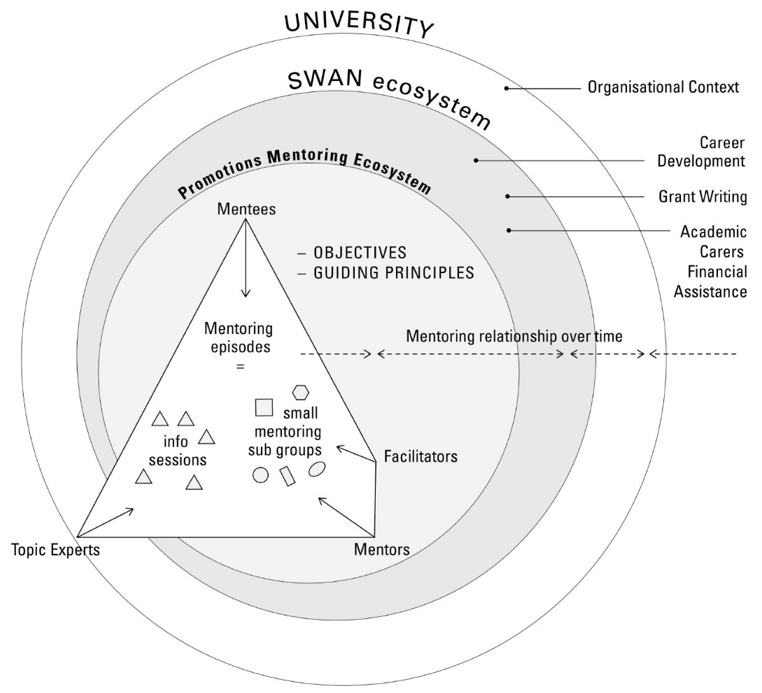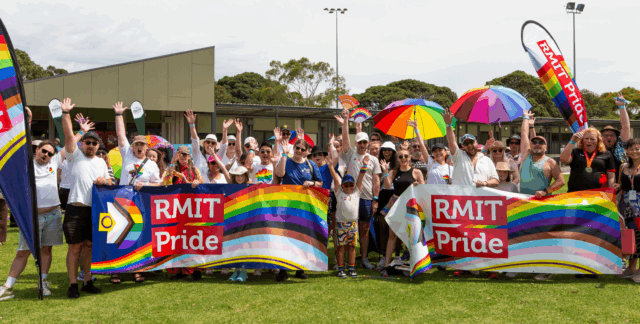Women in academia face gendered barriers to their career progression, including bias in recruitment processes, disproportionately greater administrative and teaching workloads, career interruptions (due to parental and other types of carer leave or periods of part-time work, for example) and heavier household and childcare responsibilities, all of which are exacerbated when intersecting dimensions are considered.
These and other obstacles slow the career progression of academic women, impeding critical progress toward equitable representation of women in the professoriate and in senior leadership positions in higher education.
Motivated to address these challenges and inspired by the work of McCormack and West,[1] three Associate Professors at Swinburne University of Technology in Melbourne took action and established the Swinburne Women’s Academic Network (SWAN).
Swinburne Women’s Academic Network (SWAN)
Created in 2015, SWAN is based on five guiding principles:
- The program has a grassroots foundation of women supporting women.
- It provides a safe space to share vulnerabilities.
- It is outcome-oriented and uses a holistic lens.
- It is social, structured, and celebrates academic women.
- It is designed to build enduring cross-disciplinary networks.
Since its inception, SWAN has evolved to include four programs that collectively comprise the SWAN ecosystem of support (Figure 1).

Three subsequent programs were created: Career Development, Grant It (grant writing support), and the Academic Carer’s Financial Assistance Program. This ever-evolving ecosystem of support is responsive to the needs of academic women and tailored to Swinburne’s specific institutional context.
SWAN programs
The SWAN Peer Promotion Program runs over a period of six months leading up to the annual promotion submission deadline, and typically engages more than 50 women as mentors and mentees each year. The program aims to:
- increase understanding amongst women academics about the promotions process and requirements;
- assist women in evaluating whether they are ready for promotion;
- assist women in preparing for promotion; and
- provide a supportive environment where women can share their experiences of career trajectory, promotion preparation and connect with other women academics.
The program actively encourages women academics to apply for promotion, and facilitates peer support within a mentoring network for women who are applying for promotion or planning to apply in a subsequent year.
The SWAN Career Development program runs throughout the whole year and engages staff from Levels A to E, as well as sessional staff and higher degree by research students. The program delivers practical workshops on career development topics that are not offered elsewhere at the institution, offers career planning and/or coaching, hosts monthly coffee catchups and produces podcasts on topics related to career development.
The SWAN Grant Writing Support program, Grant It, supports women to prepare grant applications to be submitted to the Australian Research Council. Grant It breaks down grant applications into their component parts and scaffolds the grant writing process over time to support women to fully construct their grant application.
The SWAN Academic Carer’s Financial Assistance Program (ACFA) is accessible to academic staff of all genders whose careers have been affected by carer responsibilities, be it for children or older adults. ACFA provides small grants to enable staff to reenergise or maintain their research activities during or after parental leave or other disruptions related to caring responsibilities. 44 grants have been awarded since ACFA’s creation in 2017, .
All SWAN programs continued to run throughout the COVID-19 pandemic, offering critical support to academic women during a period of global upheaval. This was particularly important, given that Melbourne endured some of the most severe lockdowns globally, which has disproportionately impacted women’s academic careers.[3]
Ongoing access to SWAN programs has supported women to weather work-from-home mandates by providing ongoing social connection and much-needed practical support, such as career development opportunities, research funding through ACFA and guidance for promotions applications.
Outcomes to date
SWAN activities have evolved from a single Peer Promotion Program into a suite of dynamic programs that nurture career development and progression, support grant writing and provide funding for research-related activities.
This ecosystem of support demonstrates that grassroots initiatives in which academic women provide support to other academic women is an effective way to help address women’s career needs. At the same time, support from executive-level institutional leadership has been crucial in securing time, space and resources to operate and grow SWAN programs.
Since SWAN’s inception in 2015, annual survey data have been collected from women engaged in the Peer Promotions Program. These surveys have demonstrated that women experience a variety of benefits from the program.
Recent qualitative data analyses of five years of survey responses generated four key topic areas that showcase the value of that particular SWAN program:
- Increased access and exposure to information and resources
- Richer connections with colleagues that support network building
- Emotional nourishment, enhanced morale and trust
- Space for professional growth and reflection
At the institutional level, SWAN has influenced policy shifts, including being instrumental in the introduction of a section to encourage relative-to-opportunity statements in the promotion application template.
SWAN also challenged and influenced change in a university travel policy that is now more inclusive for staff with carer responsibilities, created leadership opportunities for women across academic levels, increased women’s representation in staff-elected positions on promotion review panels, strengthened the pipeline of women for upper-level leadership positions by increasing the number of women promoted to senior levels, increased the number of applications for Australian Research Council grants led by women chief investigators and expanded access to career development opportunities for academic women, including sessional staff and HDR students.
SWAN demonstrates that a multi-faceted ecosystem of support led by and for academic women can positively influence individual women and institutional culture by bringing gender equity initiatives to the attention of the whole university, and by increasing the perceived importance of gender equity in the eyes of executive leaders.
The cumulative effect of mentoring programs that span the career lifespan and that directly impact key career milestones for academic women can shift university culture, systems and policies in material ways. Indeed, SWAN is now woven tightly into the fabric of Swinburne University.
Tips for other institutions
- Start small and cultivate an ecosystem over time. SWAN started with the Peer Promotion Program and built from there based on feedback from academic women.
- Build from grassroots. To tailor your program(s) to women in your institution, a grassroots approach is important.
- Think sustainably. Structure programs such that sustainability beyond the founders will be ensured.
- Identify champions. Develop close relationships with other parts of the university (e.g. People and Culture, Provost, Research) and identify senior leaders who will champion your program(s).
- Be patient and steadfast to ensure that your program(s) becomes woven into the fabric of the institution takes effort and time. Don’t give up!
- Evaluate from the outset. Consider how you will evaluate your program(s) over time using quantitative and qualitative methods. This will help your initiative remain relevant to the needs of women within your institution over time. It will also ensure you have a record to demonstrate outcomes associated with your program, which may be necessary to garner funding and ongoing support from your institution that will enable expansion of your program(s).
- Document impacts. Keep a record of activities and achievements, noting impact at the individual, organisational, and broader levels. This might include emails and other communications with senior leaders at your institution, changes to policies, etc.
References
[1] McCormack C and West D (2006) ‘Facilitated group mentoring develops key career competencies for university women: A case study‘, Mentoring & Tutoring, 14(4):409–431.
[2] Lunsford LG (2016) A handbook for managing mentoring programs: Starting, supporting and sustaining effective mentoring, Routledge, London.
[3] Cardel MI, Dean N and Montoya-Williams D (2020) ‘Preventing a secondary epidemic of lost early career scientists: Effects of COVID-19 pandemic on women with children‘, Annals of the American Thoracic Society, 17(11):1366–1370.



